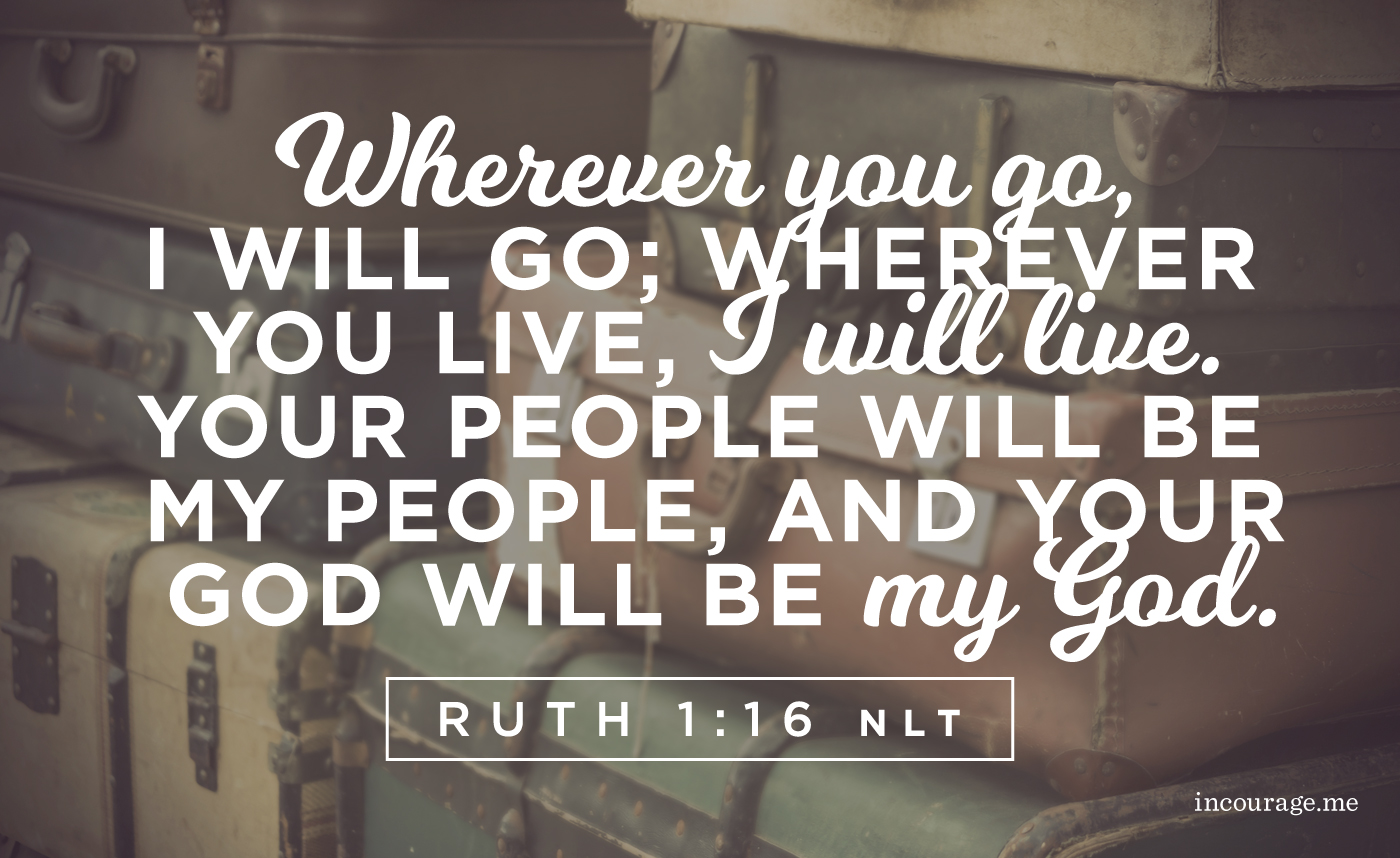“Don’t ask me to leave you and turn back. Wherever you go, I will go; wherever you live, I will live. Your people will be my people, and your God will be my God. Wherever you die, I will die, and there I will be buried. May the Lord punish me severely if I allow anything but death to separate us!”
Withholding Nothing, Together We Go
In this exchange between Ruth and her mother-in-law, Naomi, radical risk-taking love declared that even though Ruth faced poverty and loneliness she would not leave her mother-in-law’s side. She promises to never forsake her or turn back even though her future as a widow was bleak and her life would be one of sacrifice if she followed Naomi. Ruth has no promise of marriage or children, no security should she grow old and tired. No familiarity that this was a land and a people she knew, a language that was familiar, customs she had grown up with. Yet, she commits her whole life to the unknown, even promising to be buried together in the same place despite the likelihood that Naomi would die long before her.
She is not only committing to Naomi, she is cutting ties with all the former things. Her old religion, her old way of life, the land she had come from. Indeed, she is acknowledging her new identity as someone who will serve and worship Naomi’s God and who will journey with her back to a land she did not know.
Much like Ruth, we are a people called to a profound and essential commitment to one another and to our God. So often our love ends just short of real sacrifice. We want all the feelings of affection, someone who gets us, someone who meets our needs, but we fail to journey beyond the surfaces of a relationship into the realm of covenant. Ruth pledged herself with her whole life. It meant sharing in the suffering of Naomi. The unknown future, the chance that poverty and loss and loneliness would follow them both as widows without someone to care for them. She withheld nothing.
When we choose to surrender to the sacrificial love of another person, valuing their flourishing above even our own, we form a relationship that testifies to the world that God’s faithfulness lives in the obedience of His people. God often uses the destitute, the weak, the oppressed, the widow, and the foreigner to demonstrate the power, glory, and faithfulness of God. We are invited to journey into the unknown even when circumstances seem bleak and unforgiving, even when all options and resources have seemed to run out.
This is the way God works out the love of His people. When Naomi was lamenting the bitter experiences of her life, somehow Ruth was able to trust in God for them both. She helped shoulder the burdens and walk alongside her until they both found their way home.
In what areas have we needed someone to come alongside and walk with us? In what ways can we show that kind of commitment and sacrifice for the flourishing of others?
Leave a Comment





Alia Joy,
I have really needed people to come alongside me in this, my fourth surgery. I cannot bear weight on my foot for at least six weeks so I have been dependent upon my sweet husband to do just about everything. I’ve been dependent upon friends and neighbors to bring meals. I’ve been dependent upon the kindness of others to visit and spend time with me as I make my way through the many hours and to run errands or do things I was accustomed to doing. It’s hard to be so dependent, but it always draws me back into a dependence on the Lord. It’s like I have to learn all over again how to rest in him. Each time I go through this, I vow to be a “go to” person for others….helping the infirmed and visiting the sick and aged. We each get caught up in our own lives that I/we forget the greatest commandment involves putting others before ourselves – love others as you love yourself. I believe we are called to sacrifice our own self-interest in order that others may flourish. Each of my trips down this road of recovery reminds me of this principle. May we all be more like Ruth…
Blessings,
Bev xx
Dear Bev, dear sister, hoping and praying for a fast recovery and so many times of enfolding hugs from our Lord 🙂 Thank you for learning from each place of dependence 🙂 Hugs!
An,
Your comment really struck a chord with me – that each period of waiting is a “place of dependence” on God. You’ve got me pondering about what I’ve learned from each of these “places” that I’ve passed through. Thank you for your ((hugs)) and encouragement…it means a lot!
Bev xo
Alia Joy,
I needed people a while back. My aging dad’s dementia got worse & he was hospitalized. Very dark time for me. God & others saw me through that time. My dad has since passed on to glory-praise God! Now I can help others-by making meals, sending cards, giving smiles & hugs, etc. This Saturday I will bake cookies for our “Feed the Multitude”. This is an organization that helps feed less fortunate in our area. There are many many ways we can serve each other!
Blessings 🙂
Beth,
You bless so many in so many ways….including me 🙂
Blessings to YOU,
Bev xo
Beth,
I’m so sorry about your dad.
Thank-you for being a gift to others.
Penny
Thank you. I needed these words today.
“When we choose to surrender to the sacrificial love of another person, valuing their flourishing above even our own, we form a relationship that testifies to the world that God’s faithfulness lives in the obedience of His people.” –this has truly given me something to think on and pray over. I can see some similarities to things happening in my own life. Perhaps my lesson is to be more like Ruth and to surrender. Great words for this Sunday, Alia.
Alia Joy,
Sometimes if we get caught up we can overlook things. I will try to do better at loving more deeply, to let go of what’s seemingly important, so as not to overlook what is. As I’m certain the Lord would want this of me. Thank-you for this beautiful nudge this morning.
Have a blessed Sunday all,
Penny
To you too, Penny!!
Bev xo
Thank-you Bev,
I pray that you make a full recovery.
All the best,
Penny
Sweet Alia, thank you for these words of insight, of kindness, from our Lord. We are told by Him who loves us, through His word and examples, to empathize and comfort those who need comfort with that which we have been given. Its in this giving away of ourselves that your beautiful words of “When we choose to surrender to the sacrificial love of another person, valuing their flourishing above even our own, we form a relationship that testifies to the world that God’s faithfulness lives in the obedience of His people.” ring so true.
God is faithful and as His people, we need to ask how we are showing His faithfulness through obedience. I have known times of facing the uncertainties alone and with people who came along side, echoing Ruth’s trust and courage that I definitely need more of. Are we helping the least of these with true love of God and obedience to Him? True faith is borne out in our stepping out into the place of uncomfortable, that stretch us, and as St. Mother Teresa said, “I have found the paradox, that if you love until it hurts, there can be no more hurt, only more love.”
May we all stretch a little today in loving, moving towards and alongside those who the Lord places before us and with us 🙂
Hi Alia,
Years ago as I walked through black-hole depression, anxiety, and despair, God sent two friends to be ‘that close’ to me. They loved me and spent time with me and encouraged me and confronted me and pulled me Up– and NEVER gave up on me–!! though I gave up.
I’m so grateful for them!!
At this time in my life, I’m walking with my elderly Mom, who has some dementia and loss of physical strength. I don’t know what the future holds for her or how I will ‘help’/support/ accompany her through this, but I trust that God will lead in every way.
I moved to CA to be near her (not on my Bucket List) a few months ago, and I have been seeing God’s hand at work!! I get frustrated or impatient or discouraged– even overwhelmed.
But God. Who is rich in mercy. Because of the Great love that he loves us with!!
But God… gives much grace in time of need. He makes the way for me to come boldly to his presence in order to receive strength and insight and peace. He fills with his Spirit so that I am not empty and trying vainly to ‘fix’ people and situations. He gives me peace so that I am not striving to figure out or change my Mom, but learning to love and accept her as she is… the same way he accepts ‘me’ in all of my weakness.
We can be sure that Ruth made a commitment where she did NOT look back. She focused on the day, the task at hand, and putting one foot in front of the other. She chose. God met her.
I love how he does that. ❤️
Thank you for sharing your heart!
Pam
The story of Ruth is a good one. And you are so right, we fail to love in a covenant way so many times. Thankfully, He keeps it if we are not able to. And sometimes, we just need to be dependent and rely on His rest. There’s not reason to feel guilty about needing someone or the Lord.
These are days when covenant and commitment aren’t altogether attractive words or compelling prompts. You’ve reminded us that there is a better way, Alia.
This is lovely – Ruth staying alongside Naomi in her bitterness. Hadn’t thought of that before.